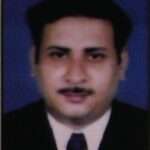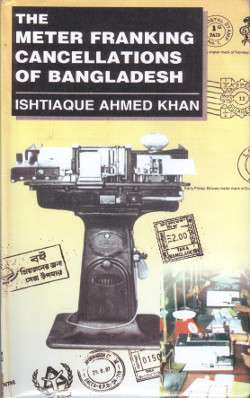
An Outstanding Philatelic Researcher Ishtiaque Ahmed Khan
By Siddique Mahmudur Rahman, FRAS
Ishtiaque came to my notice in one of the philatelic auctions about four decades ago. In early 90’s, while anyone was bidding on some philatelic items, a small boy from the back seat was raising his price. Though the price was within the reach of general philatelists. I was also one of the bidders. We, the senior persons, used to follow an ethics, that, when any young collector wants to catch an item, we would certainly resign after raising the price a bit, just to make him feel himself the ‘winner after fight’. Gradually Ishtiaque became an integral part of all types of philatelic activities of Bangladesh within a very short time.
I couldn’t attend all the activities due to my important preoccupation in my professional activities. Besides, I became more involved in research on theoretical aspects on philatelic history of Bangladesh and publishing books on this subject, not concentration on collection. I formed Bangladesh Institute of Philatelic Studies, a unique research institution on this subject. During the next decade, I published a few important books and monographs, which were displayed in different international philatelic exhibitions and I earned a few prizes as well.
In 1992, when Bangladesh Post Office arranged the National Philatelic Exhibition at Bangladesh National Museum premises, Ishtiaque worked hard as a volunteer in preparing the display of the exhibition, fixing them before the show and dismantling those after the show as well.
Sometimes in 1996, One day Ishtiaque came to my office with a manuscript. It was a rudimentary work, written in not-so-good English. The name of the paper was ‘Meter Franking Cancellation of Bangladesh’. I scanned through one and two pages and found out that subject was an innovative one. So I said, ‘The subject matter is good, but the language should have to be edited thoroughly.
Ishtiaque said with much timidity, ‘I want to publish this monograph under the banner of the Institute. You have to look into it.’
I said, ‘The cost of production will be a bit high.’
He said, ‘No problem. I’ll pay for that.’
I took up the project at his interest and finding the study a unique one. He was then a student of twelfth class. His English was not so good. I toiled very hand in making the monograph a presentable one. He collected more than a hundred pictures. I scanned those images in my scanner. And started to design the book for printing. During this process, he used to visit my office and sometimes in my house too.
Suddenly he was absent for a long period of time. I went to his house at 2 Larmini Street, Wari, to look after the matter. It was evening, he was having his hair-cut at his room. He looked very sick. Still he talked to me smiling, ‘I’m going to Singapore for treatment. Let me come back, then I can work out the rest of my job.’
After a few weeks, one day he entered my office room and said, ‘I underwent a serious surgery. An unwanted growth in my spinal cord was making me sick.’
I asked, ‘Are you O K now?’
He spoke in a doubtful voice, ‘Of yes. But this disease does not go away altogether. It might grow again.’
I was skeptical. Didn’t know it will emerge as fatal again. Ishtiaque’s attitude, movement, words all were desperate, revolting. As if he’s going to push away everything.
A few weeks later, I published the book. I created great sensation among the philatelists, but it was not economically profitable. A few copies were sold. But we remained very close. He used to come to my office and also to my house almost regularly. His behavior and manners attracted everyone whoever meet him once.
A few months later, Ishtiaque came to my office with a giant manuscript.
I smiled and asked, ‘What is this, now?’
He said, ‘Itis the Bengali translation of Principles of Scientific Management by Frederick Winslow Tailor. I want to publish it. Please give me your full assistance.’
I agreed. Though, the payment of previous book has not been cleared yet.
It took ages to compose his handwritten manuscript into computer. Because his writing was not very smooth. Then it was very troublesome to put the notes on each page. Even so, the whole book was composed at one time.
I edited the book thoroughly taking over a long period of time. Then the book was finally printed.
I did everything necessary to produce a very high quality publication. Because I don’t know why I liked Litu very much. Although this book did not sell as many copies as he said. In fact, he did not know how to market the books. In fact, this matter is very complicated in our country, so people do not know about many good publications. Those who control the book marketing; do not help anyone in this matter.
Apart from these two books, whenever he wrote any text, he would ask me to edit them. Apart from the subject of philately, he used to edit and revise his textbooks, university study notes with me. I have one or two more manuscripts of his waiting for publication, I don’t know if they will ever be published. That way no one will come to me and take work from me.
I heard the news of his last illness from Salam Bhai, Mr. Abdus Salam, B.Com. He talked to him for a good period of time, speaking out his last words to him. Salam Bhai said, ‘Everyone is not allowed to meet him, I am sure, you can meet him if you go.’
I promised him I would meet Litu.
But at that time there was such an unusual cold in Dhaka that I could not leave the house. Besides, I was not living a very normal life after the death of my only child, Fiha.
In the meantime, he left.
I was totally shocked to hear the news. I could not think that I will not see him again.
We, the old people of the society are becoming burden, but the bright and lively young people are leaving one by one to wound our souls. There is no answer, no explanation. There is nothing to do except to surrender to the will of Allah and pray.
I utter the same prayer for Litu, that I speak out every day since the death of my only child.
Istiaq,
I pray to Almighty Allah to give you eternal peace and absolute happiness in the Afterworld, in exchange of all the sufferings of your whole life, wherever you are now, whatever you have suffered in these few years of life in this world.
A Short Resume
It was in the hands of his father. Tariqul Alam Khan, (a notable stamp collector of British India from 1938 to 1945) that Ishtiaque Ahmed Khan was introduced to the world of stamps, but his real introduction to formal philately was on Banglapex ’84, where he exhibited in the Youth Class. Ishtiaque Ahmed Khan became a FRAS. London and contributed to the publication of Bangladpedia. As a prominent philatelist, his works has been published in renowned philatelic journals, like, India Post, and Stamp Magazines. Author of several books, lshtiaque dealt with subject matters as varied as Meter Stamps of Bangladesh to academic translations on Management. In 1996, he wrote an outstanding book, The Meter Franking Cancellations of Bangladesh. The book, published in 1996, under the banner of Bangladesh Institute of Philatelic Studies (BIPS), outright captured the heart of the philatelists of home and abroad. Book reviews were published in several international philatelic journals. The book won an award in Canadian International Philatelic Literature Exhibition in 1998.
Ishtiaque died on 10th January 2010, he survived by his mother and his beloved elder brother Mushtaque Ahmed Khan. He also left behind countless friends at home and abroad- historians, academicians, numismatists and philatelist- to mourn his death.



